
New services are being launched by applying digital technology to such diverse areas in our lives such as transportation, finance, and healthcare. In a “digital society,” ubiquitous sensors connected to networks, AI, and robots will bring about increased efficiency relative to almost everything and significantly change the structure of society. These technologies and services may eventually greatly influence how we think and act as humans. The signs of a digital society are reflected in how the thinking and behavior of people living there might change. Discussion on this topic will encourage us to consider future issues in society from the perspective of people living there.
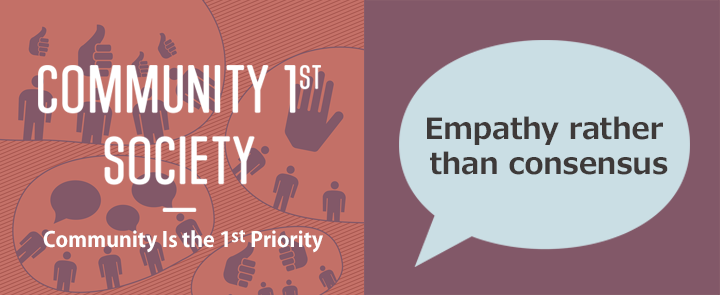
A community is a small group that can take different forms. Some are based on relationships within a region, or some perhaps through a bond of shared feeling of what is good.Imagine a situation where the population of a town decreases, and the citizens begin to sense difficulties in daily life. They may seek a new framework for transportation or medical systems. But isn’t there a possibility that national government or major decision makers in society may not always be able to flexibly accommodate their needs?Technology such as AI can be used to help visualize the will of a community in ways that have not been available before. IoT will enable creative ideas for convenient services and new frameworks based on what is valued by that community.Is a society where common empathy could drive the creation of new societal standards just around the corner?
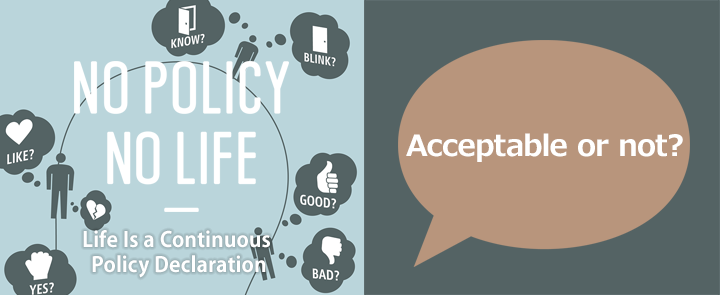
It’s common knowledge that athletic performance is governed by data. Behind the finest athletics that fire-up spectator emotions, is a regimen of objective measurements of an athlete’s physical and mental performance. The same data inevitably may identify minor weaknesses that even the athletes themselves were unaware of. It may shock them or be taken advantage of by competitors. In such a way, while data analytics promises to enrich our lives, it may at times slap us with unexpected and inconvenient facts as transforming something into data will show in black and white things which may not have been obvious before. What do we do? Should we strive to change the data, or do we decide this as “something that we can do nothing about” and resign ourselves to accepting the “facts,” or do we ignore it as “not my business.”As society becomes increasingly digitized, our lives will be filled with such “facts” and decision-making. How will we choose to deal with various types of data? Will this be one of the big challenges for a meaningful life in the future?
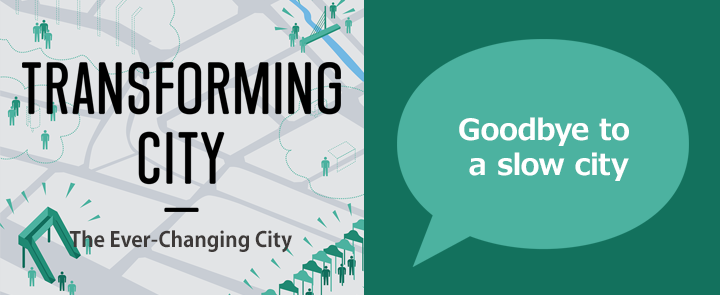
Advancements in technology are providing us with tools to “create solutions by ourselves. Imagine a situation where there is a sharp curve on a local road with heavy traffic. Residents raise their concerns that “an accident is waiting to happen.” Until now, they may have requested local government to address the issue; felt frustration at the slow response. With the advent of 3D printing, it will probably be quite easy to create a DIY guardrail in the near future. So imagine a future where new infrastructure can be created one after the other led by local residents. Cities might become increasingly customized. But the challenge will be to create an attractive city - as the maintenance of infrastructure or services is more difficult than its creation, and so is its disposal when it is no longer necessary. New infrastructure and maintenance in keeping with changing lifestyles or aging residents cannot be avoided. Will an agile cycle of “creation, maintenance and disposal” be a key factor to create attractive cities in the future?
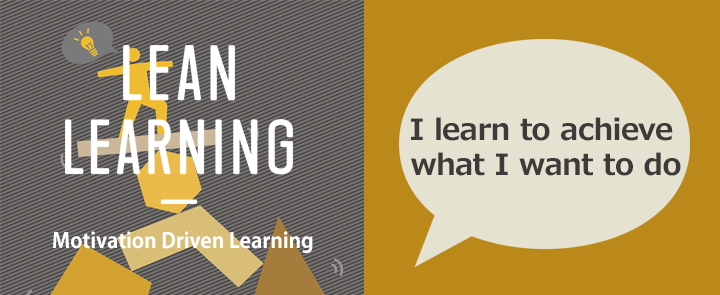
Today, the main role of schools is to provide a place to gain basic knowledge in calculation or literature, and their applications. Recently though, new approaches have started to emerge. For example, students set goals such as “make xyz” and learn the basics and skills while working to realize that goal. At first, students may not have the confidence and encounter challenges due to their lack of basic knowledge and experience. Are there benefits from learning through trial and error with the support from AI? For students who wish to study more in the process, imagine having access to a framework that will make college classes available for free via the Internet. In the future, a school may not be a place where students sit side-by-side at their desks to study basic disciplines but a place to foster human qualities through group interaction while learning through achieving personal goals.
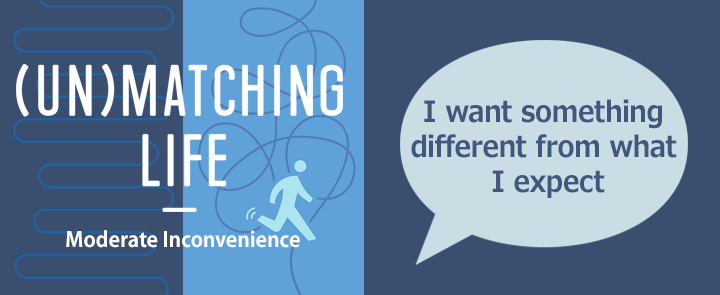
Matching services provide information tailored to you. The information may not be limited to things and services such as food, clothing and accommodation but may include job selection, or even extend to finding friends or lovers. We can obtain information we want quickly and easily without wasting time and effort. It is certainly convenient but when we start to think, “Is that what we really want?” there is room for doubt. For example, if you use a service that selects your daily attire, it could be depriving you of the chance to improve your fashion or even erode your decision-making capabilities. It might even be robbing you of a chance encounter with “things you don’t like now but may find attractive.” Sometimes, the wonder triggered by a coincidence may provide more value than convenience. So a life with moderate inconvenience might be what we really need. What do you think?
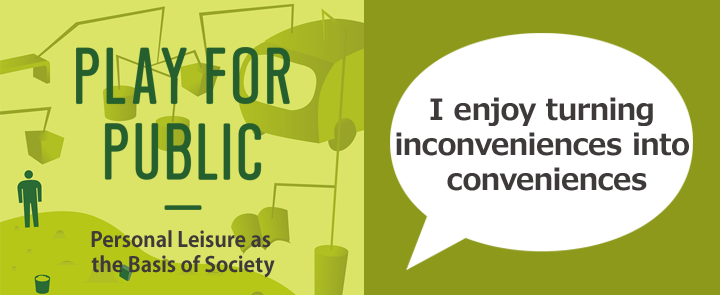
Digital technology is making it easier to create “home-made solutions” to make life more comfortable, such as obtaining information on the weather when you are away, or a train delay in progress, or even the location of a good ramen shop. Sites and applications created on impulse by someone thinking “this will make my daily life more convenient and fun” can spread throughout society in an instant. Of course, insufficient design considerations may give rise to errors or trigger unexpected incidences. We should not ignore such waves of creation springing from personal inspiration just because there are risk but consider how this force might be used to enliven society as it will easily overcome any political or economic restrictions, and continue to create an interesting society.
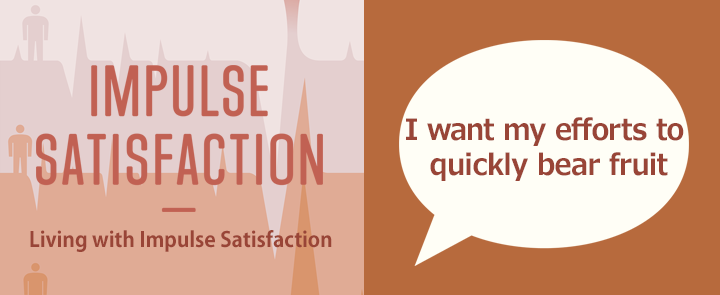
People set goals in life to work towards but the presumption by society is that these are long-term. How will society change as “instant gratification” satisfying a sense of achievement or self-esteem increasingly become motivating factors in life? Communication with others is focused on gaining a favorable response through by SNS, so much so that “instagenic” restaurant menus and travel destinations are preferred. On the other side of the coin, the type of lifestyle which called for endurance and hard work to achieve one’s dreams, such as buying that high-end car or owning a luxury home in a certain neighborhood one day, has no appeal. Today, there is no need to own a car to drive it. It can be leased under a fixed monthly rate, under the name of “cost performance priority.” One can even drive a different model every month. While it may appear that people today are only living for the moment, they also participate in philanthropic activities and public service if it takes their interest. This is a force that can change society. Digital technology has made it possible to “instantaneously change” even hardship into a fun tool.
Self-fulfilling happiness
The age where AI will execute many tasks on behalf of humans is almost here - just as there is a limit to the number of papers one researcher can read and AI can “read” much more in a shorter period of time. The changes will be seen first in “knowledge-heavy tasks” which AI is particularly good at, such as those performed by doctors, lawyers and engineers. Leading from there, it is expected that AI will be able to make the connections between different disciplines of study, to generate socially relevant new values such as the discovery of ways to treat previously intractable diseases or technology innovation beyond human imagination. As AI begins to handle many time-consuming tasks more efficiently, people may have increasingly more “free time.” How should we spend this time? How can we use this gift of time to create new value in a way that AI cannot? Can getting involved in activities that contribute to society; working to help people nearby, or for one’s community, help to create a new sense of belonging and fulfilment?